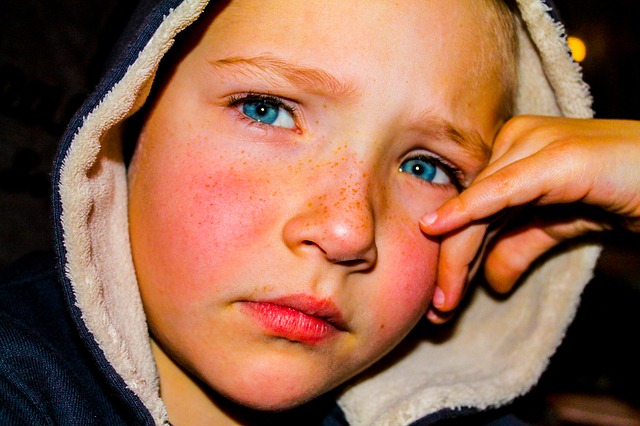
I have realized for some time that my son’s intense reactions to things often have to do with sensory overload and the anxiety that it can trigger in him. I recently read Peaceful Parent, Confident Kids’ article on Supporting Your Child Through Rage and realized that while I do accept these feeling from him, I have also developed some significant tools to help him manage these things. I knew all the things to say, I knew all the things to do. I knew how to listen with acceptance, I knew about HALT and STOP and other emotional management tools. However, once I began to look for resources for him to start managing it on his own things began to change. He needed some skills that would allow him to develop the important life skill of managing his stress and he needed to depend on me less to help him do it. I was confident that he could because, as with anything else he does, when expectations are very clear and concise he can overcome his obstacles. I knew with some work, he could do this too.
I noticed while we were on vacation that he would frequently go into repetitive questioning mode. He would ask A LOT when we were going swimming, to the beach, to get ice cream…whatever it was that day. “Is it time yet?” “Can we go now?” “When are we going?” ” Are we going to go soon?” It was driving me nuts. Finally, I had a realization and saw that this was a situation I needed to listen to more closely. He was not trying to pester me, which it definitely felt like, he was trying to tell me something. He was worried! So, taking my hint, I Active Listened:
Me: You seem very concerned about going swimming today.

Son: Yes! I’m worried we won’t end up going! I don’t know WHEN we are going!
Me: So you are uncomfortable because you think we might end up not going at all.
Son: Yes! I can’t tell time yet and sometimes you say we’ll do some things if we have time. I don’t want to wait to see if we have time. I want to know!
Me. You sound really worried we will run out of time even though I promised we would go.
Son: Right! I don’t trust that we will go so I can’t stop thinking about it.
Me: And you can’t stop asking me questions until you know the answer!
Son: Right I don’t trust that we will really go!
Me Ok, I understand…..what would help?
Son: If we wrote down a plan so I could see when we were going.
Me: You would like a schedule? That would help?
Son: Yes! Then I wouldn’t have to ask you, I would know.
And there came the brilliant idea. We use this tool religiously on vacation because everything is so different. For a child that has a hard time with change it makes traveling so much easier. Several months later – I began seeing similar behavior at home. He was doing a lot of things that told me he was not feeling as secure as he needed to feel. He was showing signs of overwhelm and anxiety. I did some research and I asked some friends in the field, but the person who came up with the idea that helped the most was him. Once again, he knew himself best. We had a problem solving meeting and decided on the schedule once again. We already used visual routine charts for morning and nighttime routines, so he suggested a more complete daily schedule so that he would know just what to expect every day. We moved the regular routines as permanent additions to the new schedule and made several copies. Each night we fill out the next day’s schedule together.
Now, typically even the thought of a schedule makes me roll my eyes. I tend to fly by the seat of my pants and enjoy life’s little surprises, but admittedly, I am realizing…it doesn’t serve me that well. One of the things that I really love about him coming up with this idea is that it was his. I didn’t give him 4 choices and allow him to pick one like many parenting strategies recommend and because I’m skilled in  Parent Effectiveness Training, I know that the enormous benefit of Active Listening and No Lose Problem Solving is that it doesn’t solve children’s problems for them. It allows them to think of the best solution for themselves, not for the parent. ( I never would have thought of a schedule because – gag! Not my style!) But this is why it works and is honored by the child – it’s the solution that works best for the child as their own person. It IS my son’s style and well, he’s not me. I could have easily imposed something that he “had to” stick to, but because this solution was an intrinsic thought, the follow through is pretty reliable and done with pride and self-awareness.
Parent Effectiveness Training, I know that the enormous benefit of Active Listening and No Lose Problem Solving is that it doesn’t solve children’s problems for them. It allows them to think of the best solution for themselves, not for the parent. ( I never would have thought of a schedule because – gag! Not my style!) But this is why it works and is honored by the child – it’s the solution that works best for the child as their own person. It IS my son’s style and well, he’s not me. I could have easily imposed something that he “had to” stick to, but because this solution was an intrinsic thought, the follow through is pretty reliable and done with pride and self-awareness.
This schedule thing has become a really wonderful evening ritual. My son likes to write his own down, my 4 year old daughter does hers by drawing hers out and I keep the master on the fridge. It is a time of connection and intention for the whole family. It helps me schedule in self-care for things like the exercise, rest, writing and even what to have for dinner the next day. We schedule in two periods of “Free Time” that each family member gets as time alone – meaning twice a day we can all do whatever the heck we want! Having it on the schedule means it is planned for, expected and agreed on mutually so everyone respects it. It’s WONDERFUL! But hands down the biggest benefit of this schedule is that my son has RELAXED. He has some control over his world. He has something concrete that can take away his worries. I have stopped over-promising things because the schedule keeps me on track. He has stopped worrying that he won’t get to do the things that are important to him. Everybody wins. We have a plan and we have peace. Mostly 🙂
Other posts you might enjoy:
One Surefire Way Your Kids Can Get Along

Out of curiosity- what happens when things don’t go as planned on the schedule? How do you guys handle that? I can see something like this working really well for my daughter, until something doesn’t happen as she/we had planned.
Thank you for asking, so far it has not been a problem. However, I would say OK so (for example) Grandma called and wants to know if we’d like to go to lunch. We also have xyz to do today – lets think about this. From there we decide together to either move the schedule around to see Grandma or not. If we HAVE to see Grandma then I would active listen to his upset (see earlier post) and then tell him my problem again and see if we could solve together. Or lets say my husband called and need a ride home because he got a flat tire I might say “we have a problem – dad called and needs a ride home because he is stuck on the side of the road. We are also supposed to go swimming. I am worried about daddy on the side of the road.” Most children will take this cue and choose to help dad though they might ask to go swimming the next day as a solution. Hopefully that helps.
How do you do a schedule with kids that are younger and can’t read or tell time. … is there a resource you use for pictures etc.
I used a very simple clip art “visual aid” for our morning routine and bedtime routine before mine could read. I put it in a sleeve cover and let them cross off the things they had done with a dry erase marker. For things like traveling, I might make a small picture book to let them “read” before a trip. For daily things I probably would not make a chart for each thing that could vary every day. For one – they don’t remember a whole day in advance but more get into a rhythm for doing things around the same time and get used to cues and clues about their day. If we were going somewhere different I would do lots of talking about expectations in advance. For example, “After we finish lunch we are going to Aunt Nancy’s house. She has two small dogs, that like to lick you. Sometimes they bark to say hello, but then they go back to sleep.” Does that help? I wouldn’t make a new routine every day for a child this age. I would keep a consistent rhythm though with wake up and eating times around the same times etc. I would also make sure to slow down during transition times of leaving the house, so expectations are clear, but also so you don’t have to rush as that tends to make transitions worse.
Becoming dependent on a schedule is not a good idea to me. If something happens that will get in the way of the routine you’re just asking for a meltdown. Kids need to be taught how to recognize their emotions and learn strategies to help them deal with their anxieties. They need to relate the size of the problem with the size of their reaction. A schedule doesn’t relieve their stress, though it may seem to, it actually enables the anxiety to exist dormant until triggered by an unwanted transition. JMO Also, I’ll be damned if I’m going to let my kid choose if we’re going to go to grandmas or pick hubby up from a flat tire!
I completely agree! If it is a not a good idea to you it is not a good idea *for* you. The beauty of this for me is this allowed my son to solve the problem himself rather than me imposing a solution that would not have met his own needs. This allows him to know he is a competent problem solver and doesn’t rely on me (or anyone else) to solve his problems. In the long run, this releases anxiety and promotes independence and self awareness. The thing is, is that solutions children think of themselves are the ones that are likely to work for them and so they stick to them because they have ownership of them. I’m not sure why you think we wouldn’t help my husband with a flat tire -indeed we would, I would just explain what was happening! The schedule is not so rigid that it ignores other peoples needs, it’s more of a general flow of the day, not a rigid schedule. The highlight in this article was not so much the schedule but the communication, mutual understanding and relationship building that happened. I’m sorry that didn’t come through more for you.